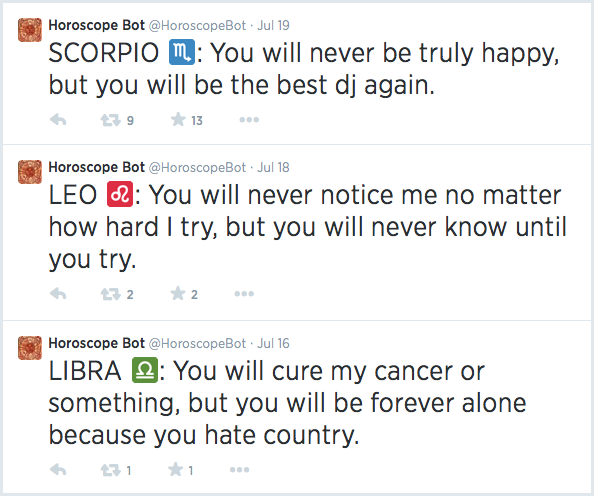
Last weekend, as a side project, I decided to create an oracle. Like most oracles he spouts nonsense, occasionally happening upon a cogent statement by random chance and serendipity. His name is @HoroscopeBot, and he takes the auspices of Twitter to post a semi-coherent prophecy every twenty minutes.
What inspired this unusual creation? Through another act of internet happenstance, I became acquainted with two prolific bot-makers: Darius Kazemi and Rob Dubbin. As I followed their various projects, I slowly became convinced that bots were more than a mere novelty. Their playfulness with language and meaning was strangely revealing. They were subversive in a world that is increasingly run by algorithms. They could also embrace the inherently unpredictable nature of automation and make it charming.
While ruminating on these bots, I conceived of a simple bot idea of my own. I decided that I needed to make it right away, and devoted an idle weekend to develop the minimum functionality. The idea was to to find tweets of the form “you will ______”. If I prepended two such statements with a zodiac sign, it would create a disjointed horoscope. For instance:
GEMINI ♊: You will come out on the banks of the Rio Grande, but you will have to build a jail.
LIBRA ♎: You will be my queen, but you will NEVER MAKE A FREE THROW IN YOUR LIFE.
SCORPIO ♏: You will understand it, but you will need tissues.
On the technical side, this involved communicating with the Twitter API using OAuth, parsing text with regular expressions, and finding a host that could re-run the logic at set time intervals automatically. Following an online tutorial, I began developing my bot in Google Apps Script.
I initially thought that grabbing tweets would be the most difficult technical hurdle, but the API was actually quite straightforward. The rub was that my application required manual reauthentication every few hours, which is a major annoyance for a program that’s defined by its ability to run 24/7. Twitter has a workaround for this; they will provide you with a single access token that will never expire. However, Google’s OAuth library would not allow me to simply provide it with a token; it wanted to do authentication the “right” way.
To make the bot fully independent, I had to port the logic to Node.js and deploy it on Heroku. This was not a smooth process (mostly due to the limitations of my git knowledge), but the twit library finally enabled me to connect to Twitter indefinitely with my access token. As of Sunday morning, @HoroscopeBot should regularly tweet new prognostications with no further intervention; you can check out the source code on GitHub.
In an interview with the Boston Globe, Darius says he was inspired by Ian Bogost’s idea that, in lieu of writing, objects can embody philosophy. In that context, I’ve thought about what sort of viewpoint my bot is advancing. Maybe it demonstrates the incompleteness of written language. Sentence fragments are fungible, and simple juxtaposition can create unintended meaning; context is always important. Alternately, perhaps it celebrates second-person aspirations. Somebody is saying “you will”, will you?




